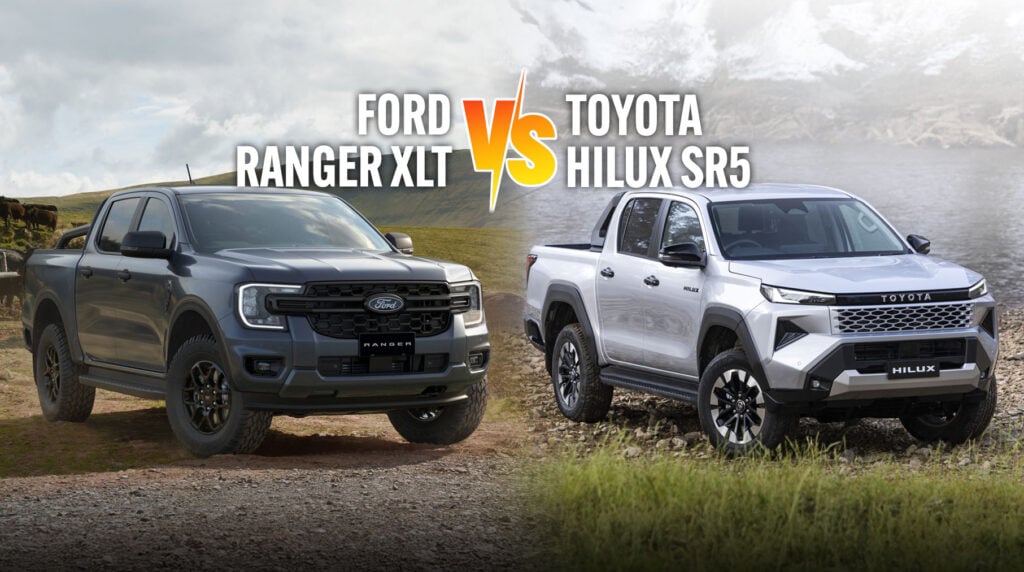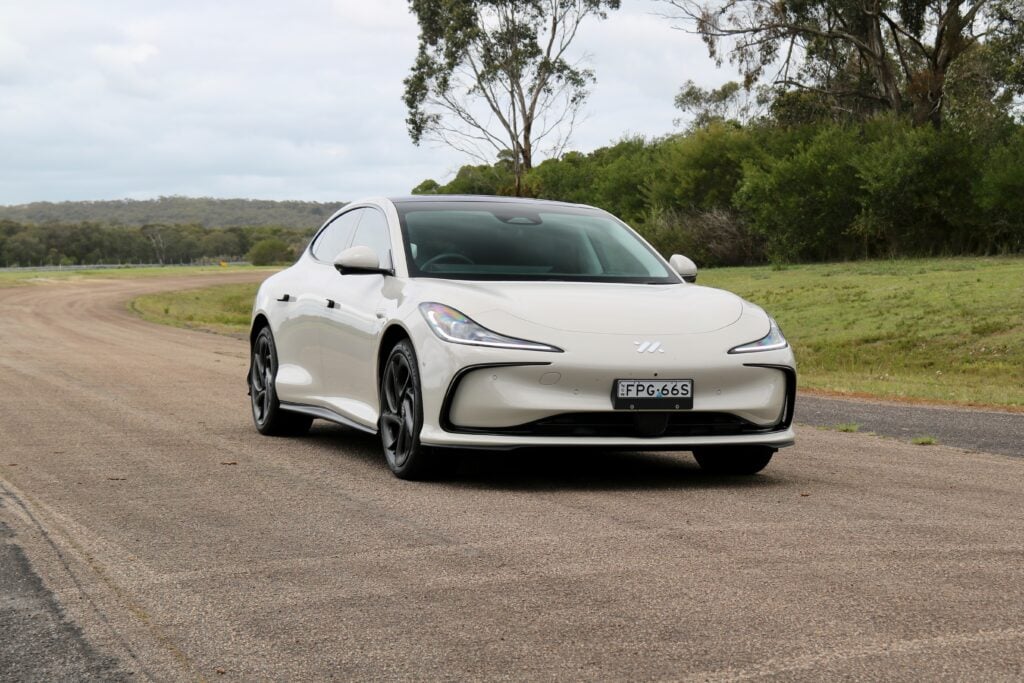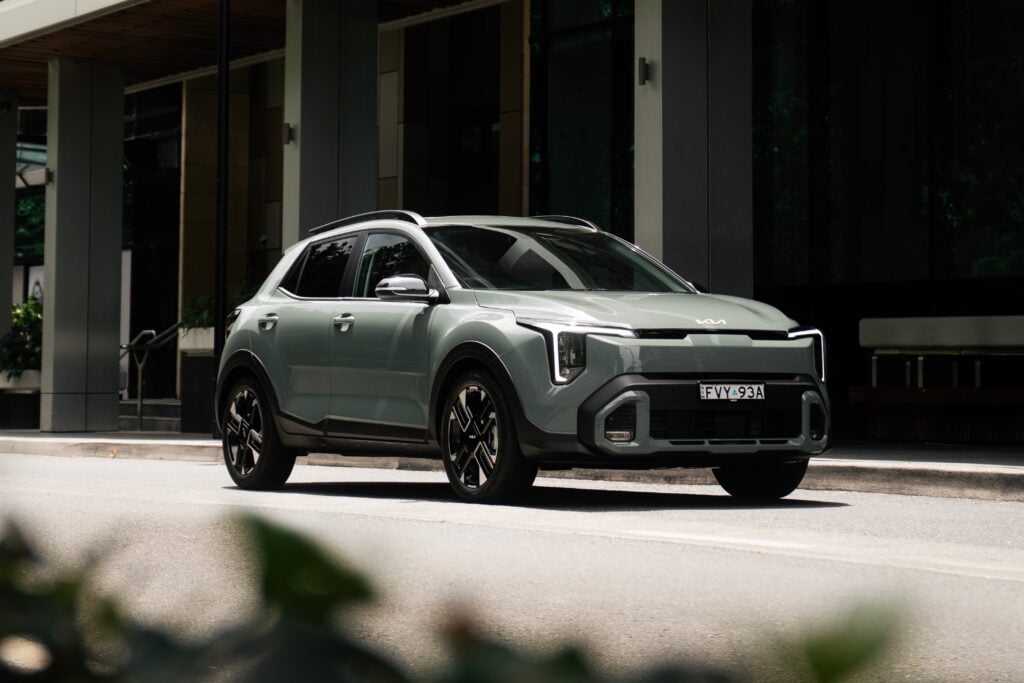Score breakdown
Things we like
- Exciting power delivery
- It has five seats…
- Chassis is playful and adjustable
- Real engine sound
Not so much
- You can feel the 200kg over a GR Yaris
- The boot is still tiny
- Drive modes seem redundant
- Good luck getting one!
The Mitsubishi Lancer Evolution is long dead, the Subaru WRX has gone soft, and it still amazes us at Wheels that Toyota was the brand to fill the void, not just with one product, but now a second!
Australia is lucky: we’re the only country outside Japan where you can walk into a Toyota dealer and decide between the GR Corolla and GR Yaris. It says something about our love of fast cars (and lack of emissions laws that we’ll conveniently ignore for this review).
The privilege of walking into a dealer and having the choice of two all-wheel-drive rally rockets does come at a cost. The GR Corolla will be popular, and with only 700 due this year, it’ll be in short supply. Pricing starts at $62,300 before on-road costs for the GTS, and the two-seat Morizo will arrive in May from (wait for it) $77,800 before on-road costs. Ouch.
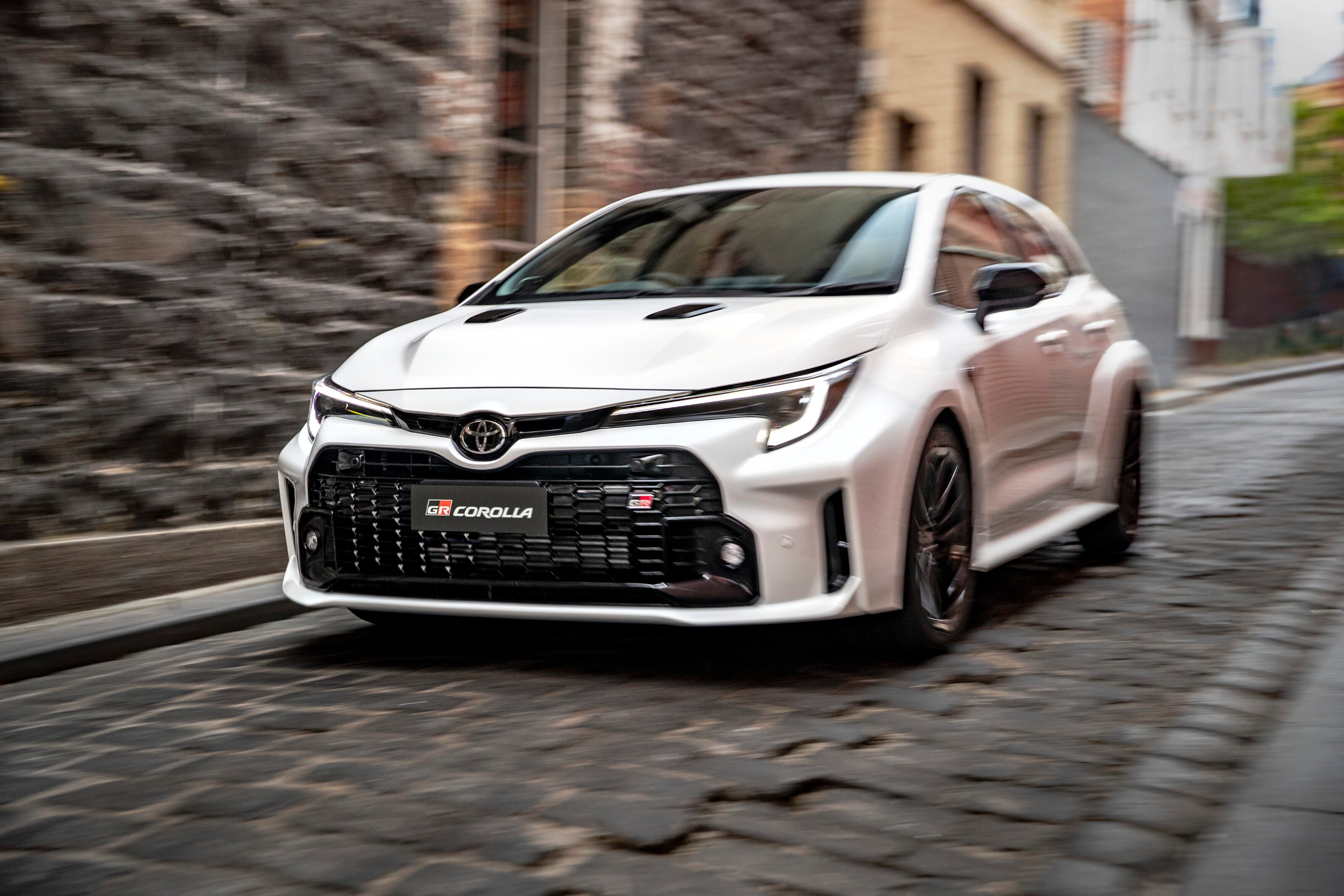
But the GR Corolla is a far more involved affair than the ’03-06 Corolla Sportivo. The arches have been pumped by 30mm at the back and 20mm at the front to accommodate 94mm and 59mm wider tracks respectively.
The bonnet’s bulge is big enough to embarrass a muscle car and has real vents to let excess heat out. And under that bonnet is a revised version of the G16E-GTS 1.6-litre turbo-petrol triple developing 221kW and 370Nm, sold exclusively with a six-speed manual transmission (for now).
For us to sample the GR Corolla, Toyota laid out a drive program through the foothills of Sydney’s Blue Mountains and a day blasting around Sydney Motorsport Park’s technical South Circuit.
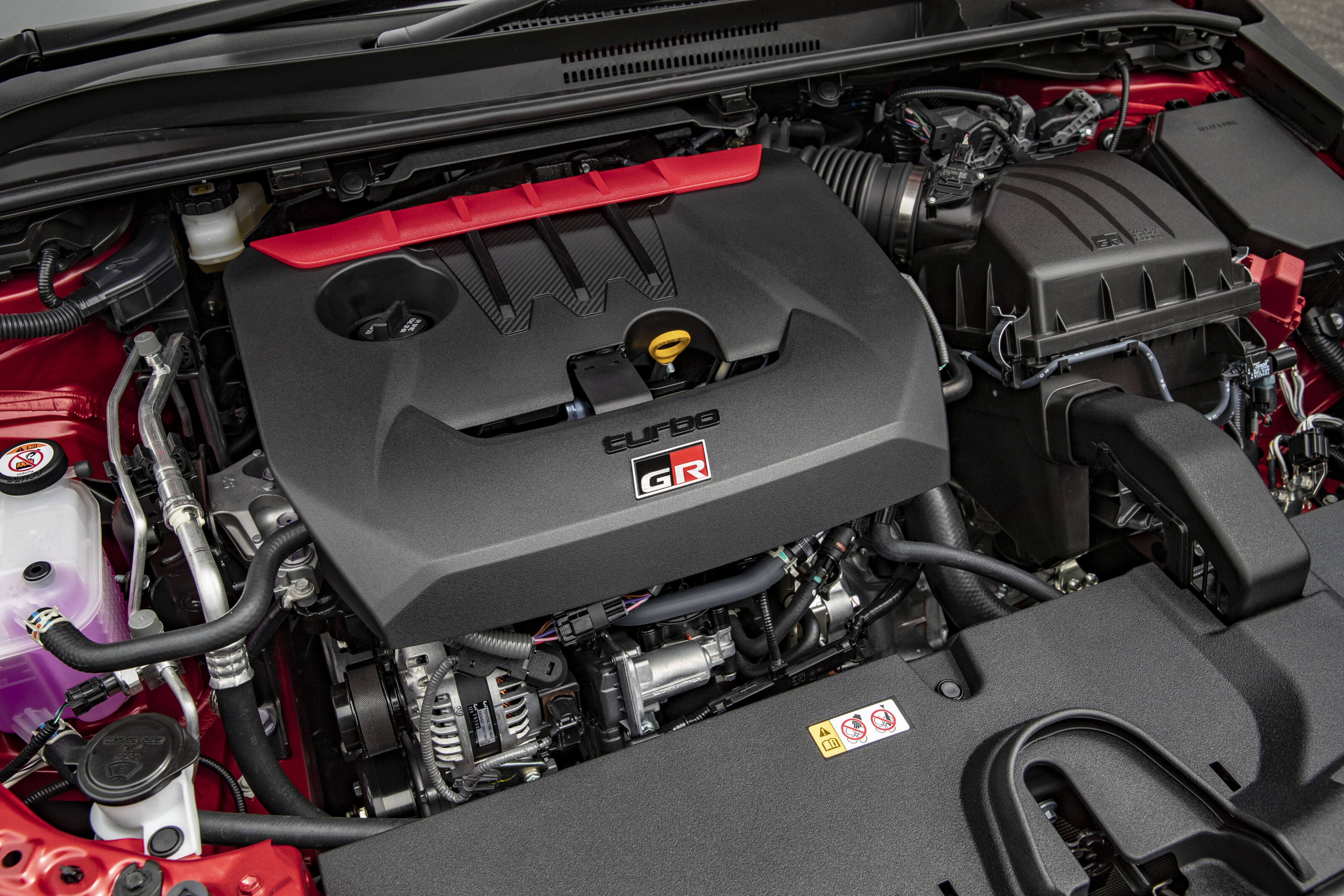
JUMP AHEAD
- How much is it, and what do you get?
- How do rivals compare on value?
- Interior comfort, space and storage
- What is it like to drive?
- How is it on fuel?
- How safe is it?
- Warranty and running costs
- VERDICT
- Specifications
How much is it, and what do you get?
Safe to say we expected more price shock at launch. At $62,300 before on-road costs, the GR Corolla may not be cheap, but it isn’t absurd.
There are plenty of goodies like seat heating and wireless Apple CarPlay, although the spec sheet is more about intangibles. It’s the GR’s quality dampers, Torsen LSDs, 349 extra spot welds, 2.8 metres of structural adhesive, high-end tyres and expensive alloy wheels – not to mention development costs – that bring up the price.
Australian-delivered GR Corollas are roughly equivalent to Circuit Pack vehicles sold in North America but with a few tweaks, including ditching the roof spoiler.
| Toyota GR Corolla GTS features | |
|---|---|
| 12.3-inch digital driveru2019s display | Heated steering wheel |
| 18-inch cast Enkei alloy wheels | Keyless entry and start |
| 8.0-inch touchscreen | LED headlights |
| u2018Brin Naubu2019 suedecloth upholstery | LED taillights |
| Dual-zone climate control | Wireless Applle CarPlay / wired Android Auto |
| Heated front seats | Wireless phone charging |
The Morizo Edition is coming in May, a homage to Akio Toyoda (affectionately known as Morizo himself) and the value equation is, well, much worse. With no rear seats, single-zone air conditioning, no navigation and no parking sensors, it’s a lot less practical.
Behind the $15,500 premium are an exposed carbon fibre roof, extra chassis bracing, another metre of structural adhesive, 30Nm more, forged 18-inch BBS alloy wheels shod in sticky Michelin Pilot Sport Cup 2 tyres, and rarity factor (only 25 will come here in the first year).
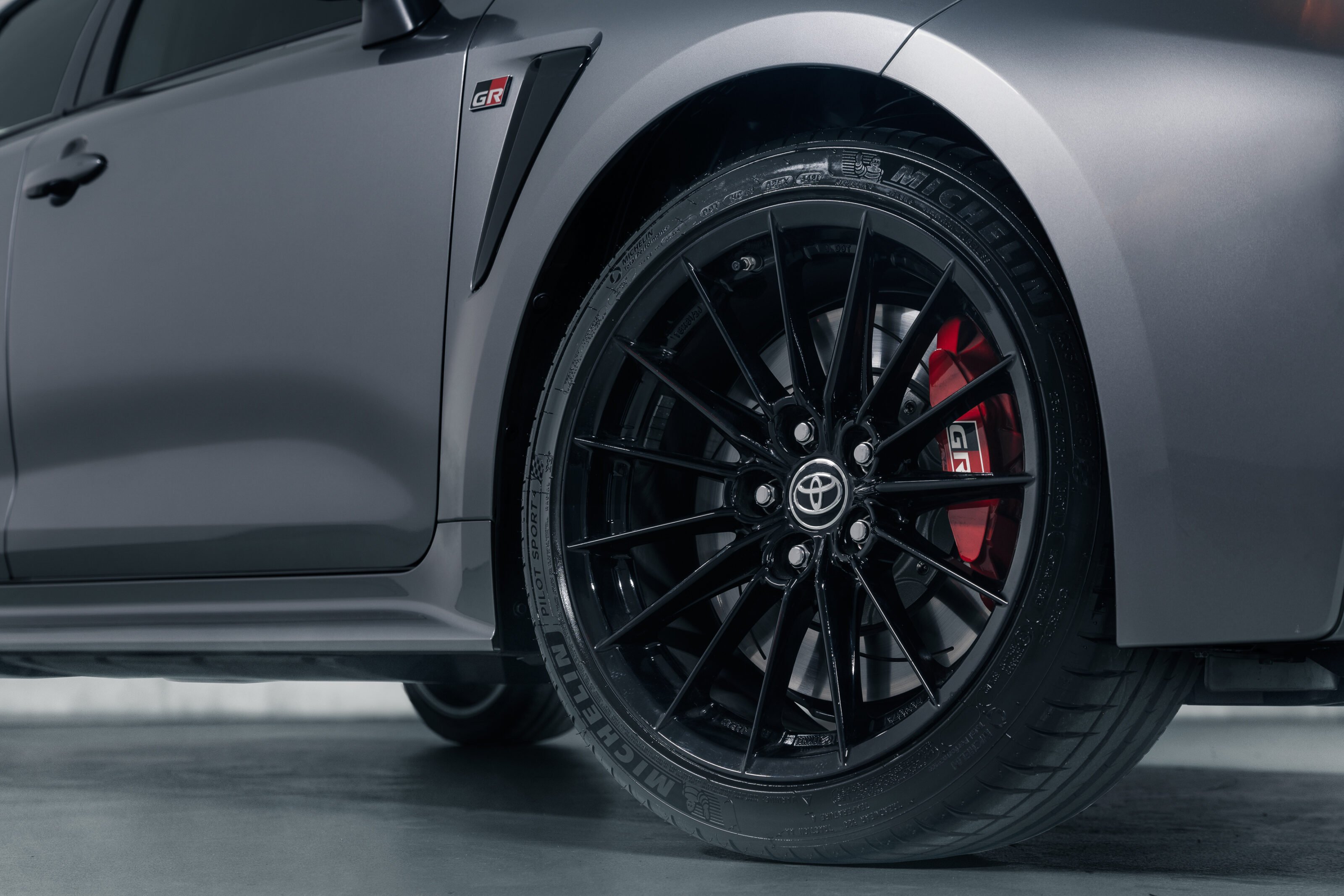
How do rivals compare on value?
The GR Corolla is a lot dearer than the GR Yaris introductory offer under which 1000 cars were sold for $39,990 drive-away (which we were told was a marketing stunt; Toyota chose to make less money on each unit rather than spend big on advertising), but nor has it shocked like the $72,600 (drive-away) front-wheel-drive Civic Type R.
It’s not cheap, though, and if you’re looking for a sophisticated daily driver you’ll be better served by a Volkswagen Golf R ($66,990 before on-road costs) or BMW M135i xDrive Pure ($67,900 excluding on-road costs) as both have much nicer interiors.
There’s also the Subaru WRX RS ($50,490 plus on-road costs) to consider. With its rally heritage and available six-speed manual transmission, the WRX remains competitive in this company, although it misses the GR Corolla’s Torsen differentials and powertrain sparkle.
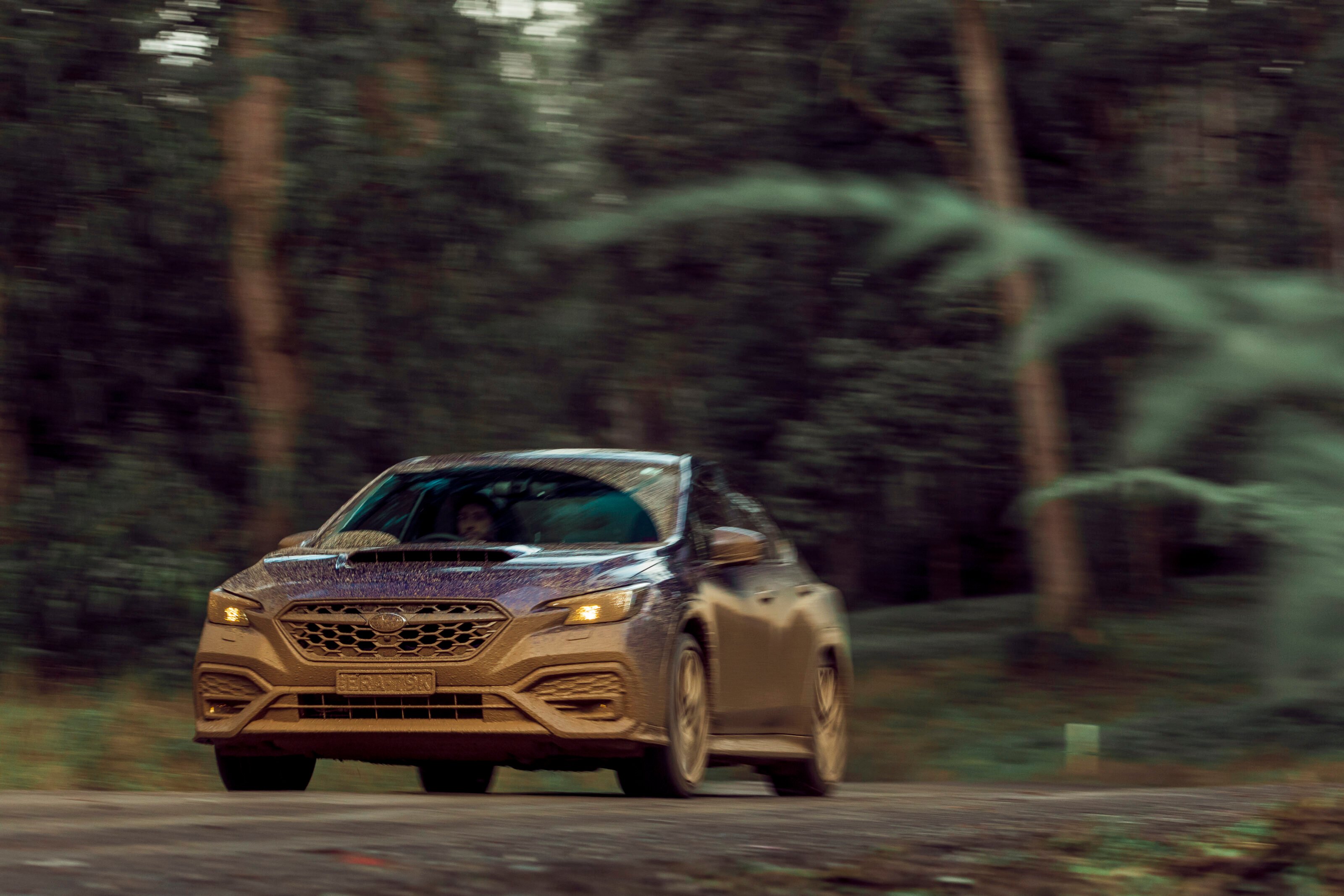
Interior comfort, space and storage
The GR Corolla may channel Lancer Evolution and Impreza WRX STI vibes, but the cabin doesn’t. There’s no acrid plastic smell and, while the plastic graining and trim colour matching aren’t quite as high quality as, say, an Audi S3, the Corolla’s materials are up to the task.
In design terms, the GR apes the regular Corolla with its jutting and slightly dated dash fascia. Storage isn’t incredible, with two cup holders, a small wireless charging tray to store your phone, and door pockets big enough for a 700ml bottle – the GR Corolla’s manual handbrake means no armrest or covered storage either.
As the GR is based on the updated Toyota small hatch, it gets the new-look infotainment system running on an 8.0-inch touchscreen as we first saw in the Corolla Cross. The UI is improved if still clumsy, so it’s best to run wireless Apple CarPlay (or wired Android Auto).
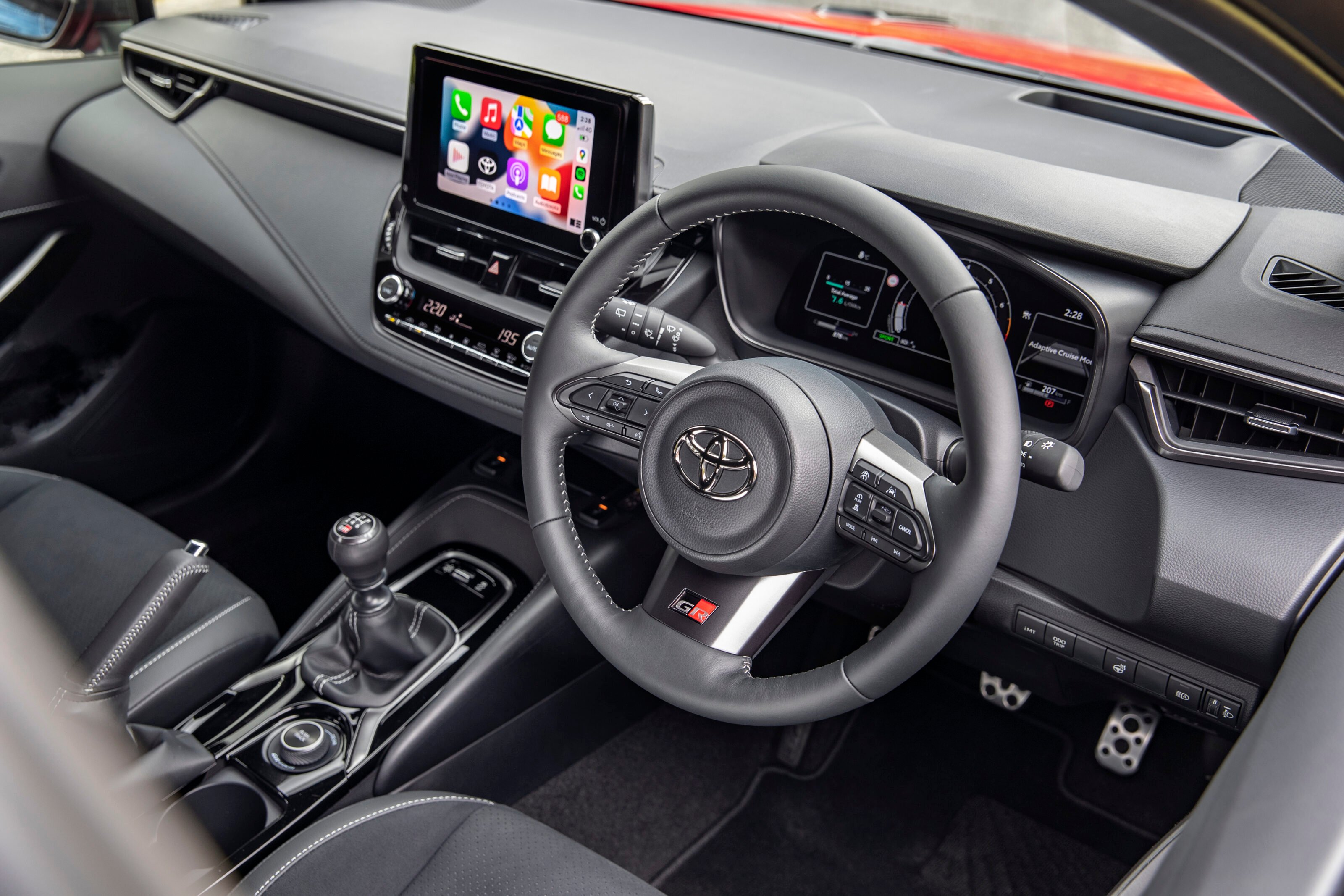
No further complaints, because the GR Corolla’s manual, suedecloth-appointed, figure-hugging bucket seats are very comfortable. The driving position is more natural than the high-set Yaris (it’s 25mmm lower, says Toyota), and vision out is much improved.
The GR Corolla’s gear shifter, steering wheel, and important controls fall easily to hand – it’s a place of business – and each control action is expertly matched in its weight with the next.
A 12.3-inch digital driver’s display is lifted from the cooking Corolla ZR with a new skin for GR use showing a big circular tacho or a sideways one when driving in Sport mode.
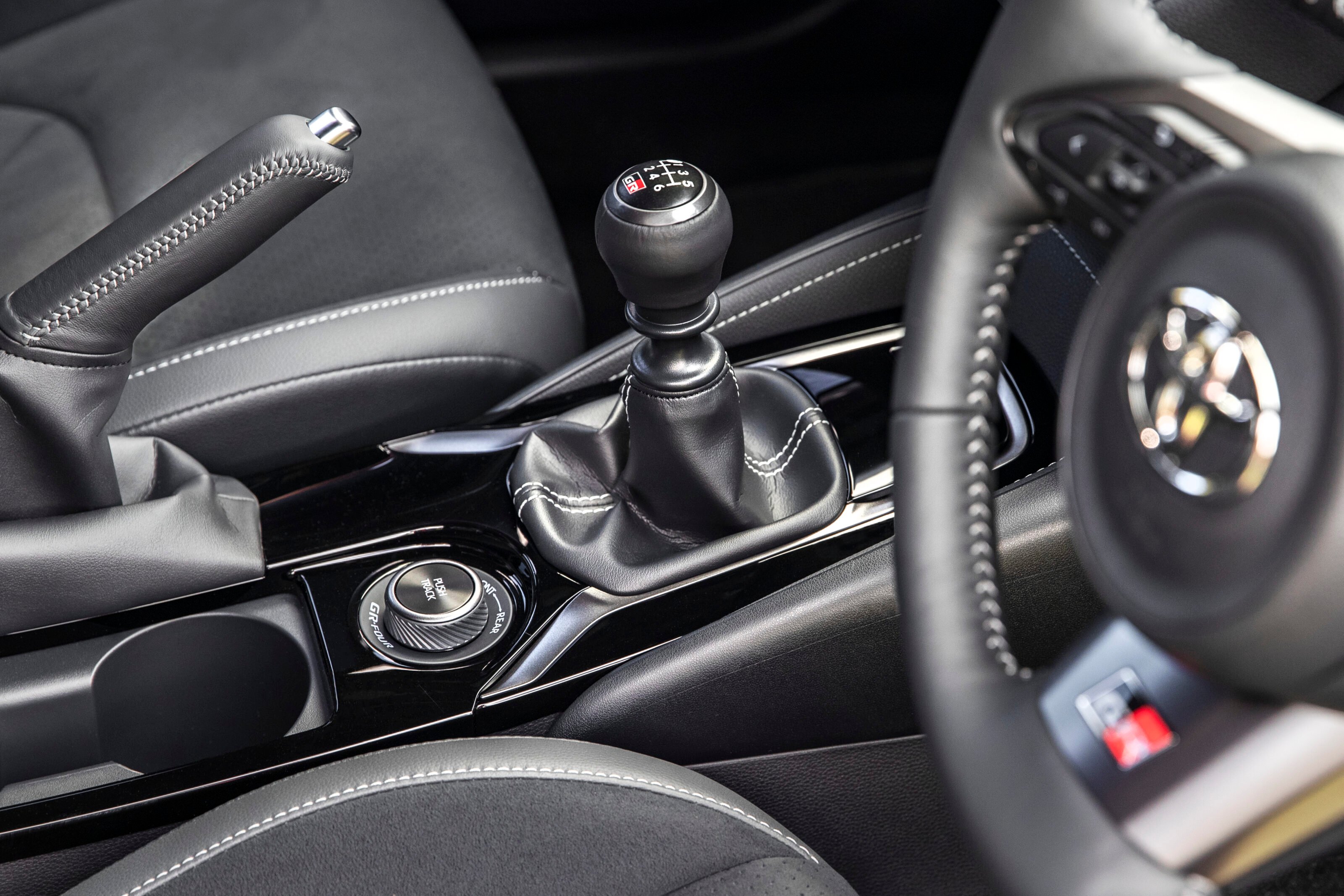
While the Corolla’s back seat has never been its forte, compared to the three-door GR Yaris it’s a revelation. Space is OK for someone under 180cm, though toe room is pretty tight and not much light makes it back there.
The boot is a similar story, measuring a measly 213L (VDA) although it is 50 per cent bigger than that of the GR Yaris. There’s no spare tyre, unfortunately, nor are there any bag hooks, just four tie-down points for netting.
What is it like to drive?
Living up to expectations in a high-performance family is no easy task. Take Zak and Harry Bates, both have grafted hard, growing up under dads who won countless trophies on dirt and tarmac – and it’s paid off. They’re at the pointy end of the GR86 and ARC racing series respectively (and both adept at making journos feel rather slow on the racetrack).
Much like the Bates family, then, Gazoo Racing’s high-performance DNA runs rich through the GR Corolla. You can tell before setting off this is a serious car, as at idle the revs rise and fall gently as though a more aggressive-than-usual cam is fitted.
Start turning wheels and it’s immediately obvious how grown-up the GR Corolla is after the Yaris. Not in its engineering per se, but in its more assured stance on the road; each tyre weighted with extra mass compared to the flighty Yaris.
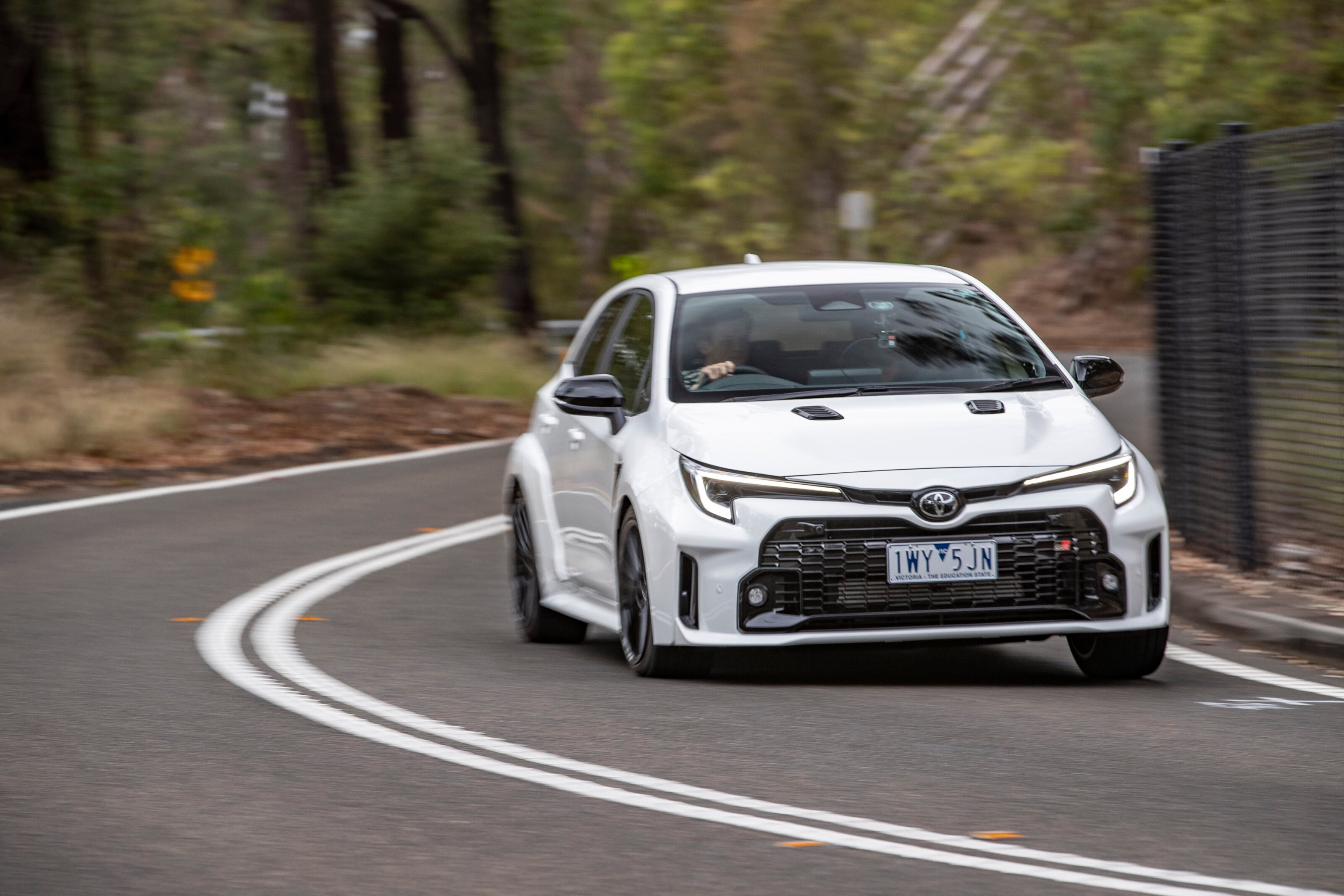
That’s no surprise, because even with some choice lightweight parts – such as the cast 18-inch Enkei alloy wheels – the wide-track Corolla is 205kg porkier than the Yaris, weighing 1485kg. It’s also all TNGA-C, rather than a mix of GA-B and GA-C as in the smaller car.
When you start opening up the GR Corolla’s lungs, the powertrain’s different character comes to the fore. Toyota didn’t just tweak the ECU to get 21kW more grunt out.
The Corolla’s G16E-GTS enhancement program includes 10 per cent more boost, better oil and water cooling, a stronger fuel pump, uprated injectors, freer-flowing triple-exit exhaust and deletion of the GR Yaris’s sound symposer.
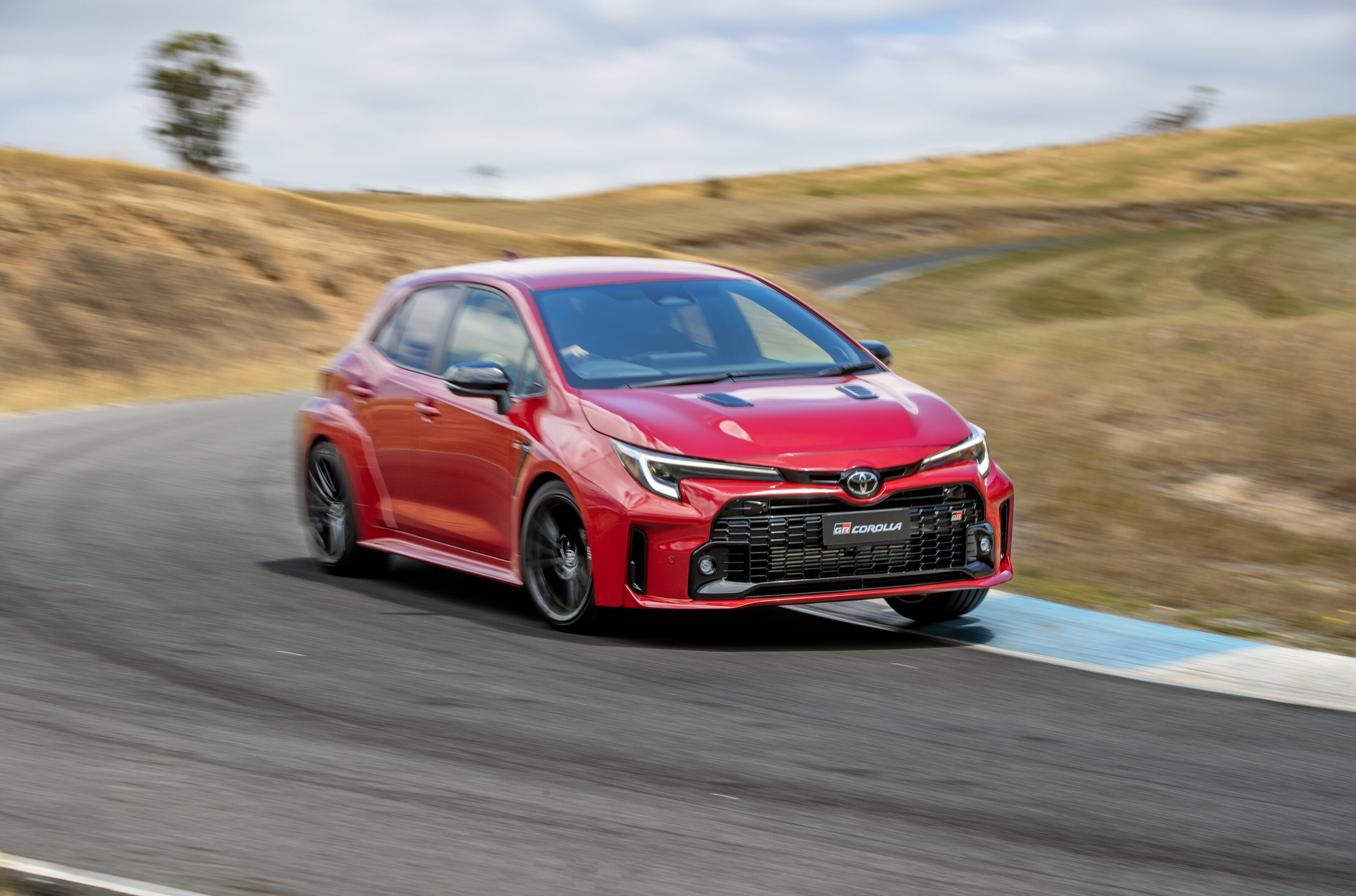
Combined with a shorter final drive ratio, moving the torque peak from 3000-4600rpm in the Yaris to 3000-5500rpm in the Corolla lends it extra urgency above 3000rpm, but that extra weight dampens the Corolla’s shove below 3K. The result is a boostier-feeling car.
Far from a criticism, it’s actually a good thing in these times of instant gratification. It makes the drive exciting (dare the word analogue be rolled out?) and engaging.
Pulling out the Yaris’s sound symposer adds to GR Corolla’s old-school feel. It’s not vocal in the way a Hyundai i30 N is, or even a Golf R, but it’s loud in other ways: mechanical sucking and chuntering; honest (if not always sexy) noises.
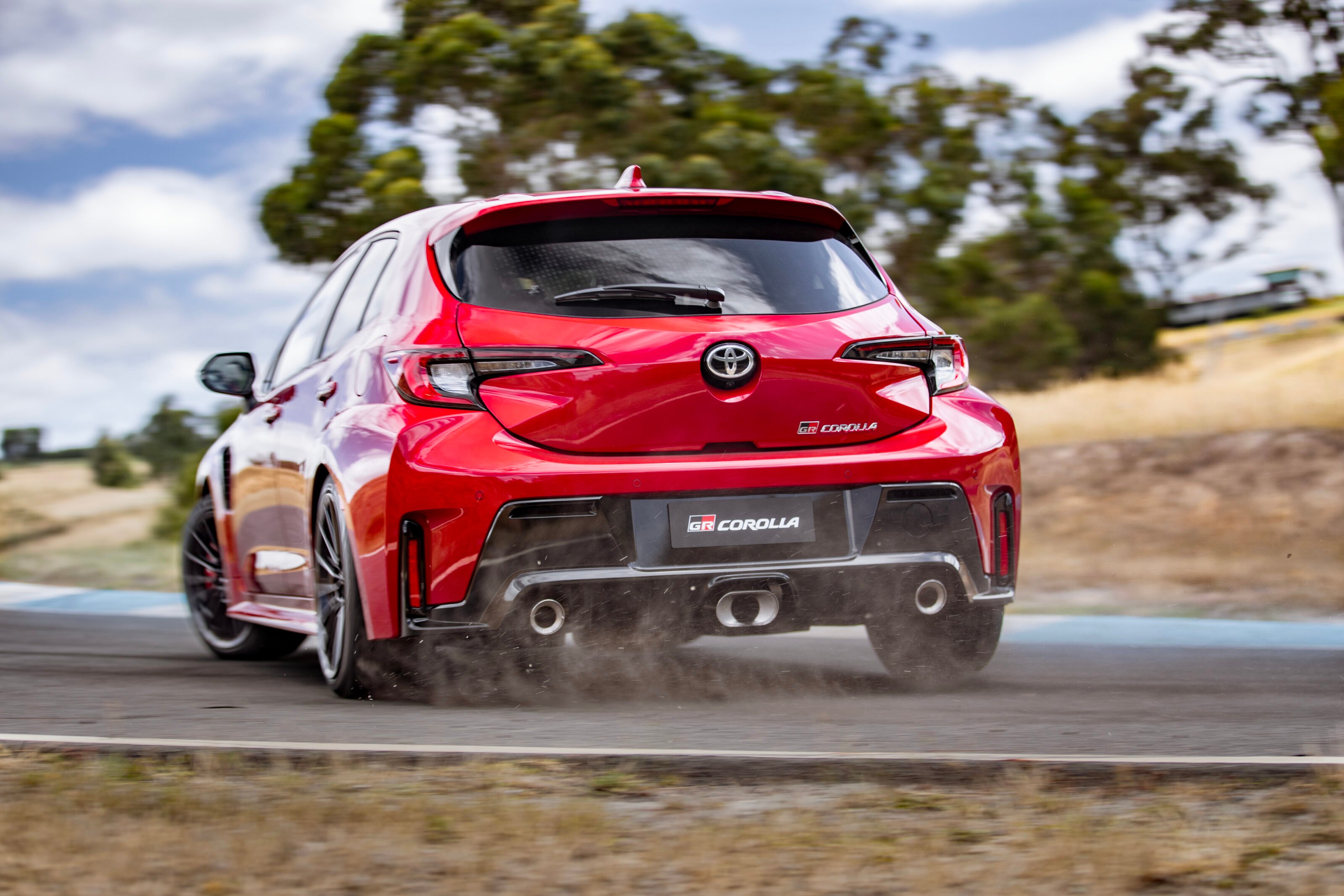
Although on-road time was short, and mainly about feeling whether the firmly sprung Corolla can shrug off body roll, it also proved the car’s ride is agreeable. There’s no Mitsubishi Evo tooth-rattling here. It’s even pretty refined on its high-performance 235/40R18 Yokohama Advan Apex V601 tyres.
If there’s one complaint, it’s that the GR Corolla’s drive modes feel redundant. Without electronically controlled dampers or a switchable exhaust, Sport just adds weight to the Corolla’s steering and makes it feel more leaden on the road. There’s also auto rev-matching, though the pedals are so well-placed that you probably won’t need it.
Sport mode for the centre diff, however, does work. It shifts the rear-biased torque split from 40:60 to 30:70, encouraging a hint of on-power rotation.
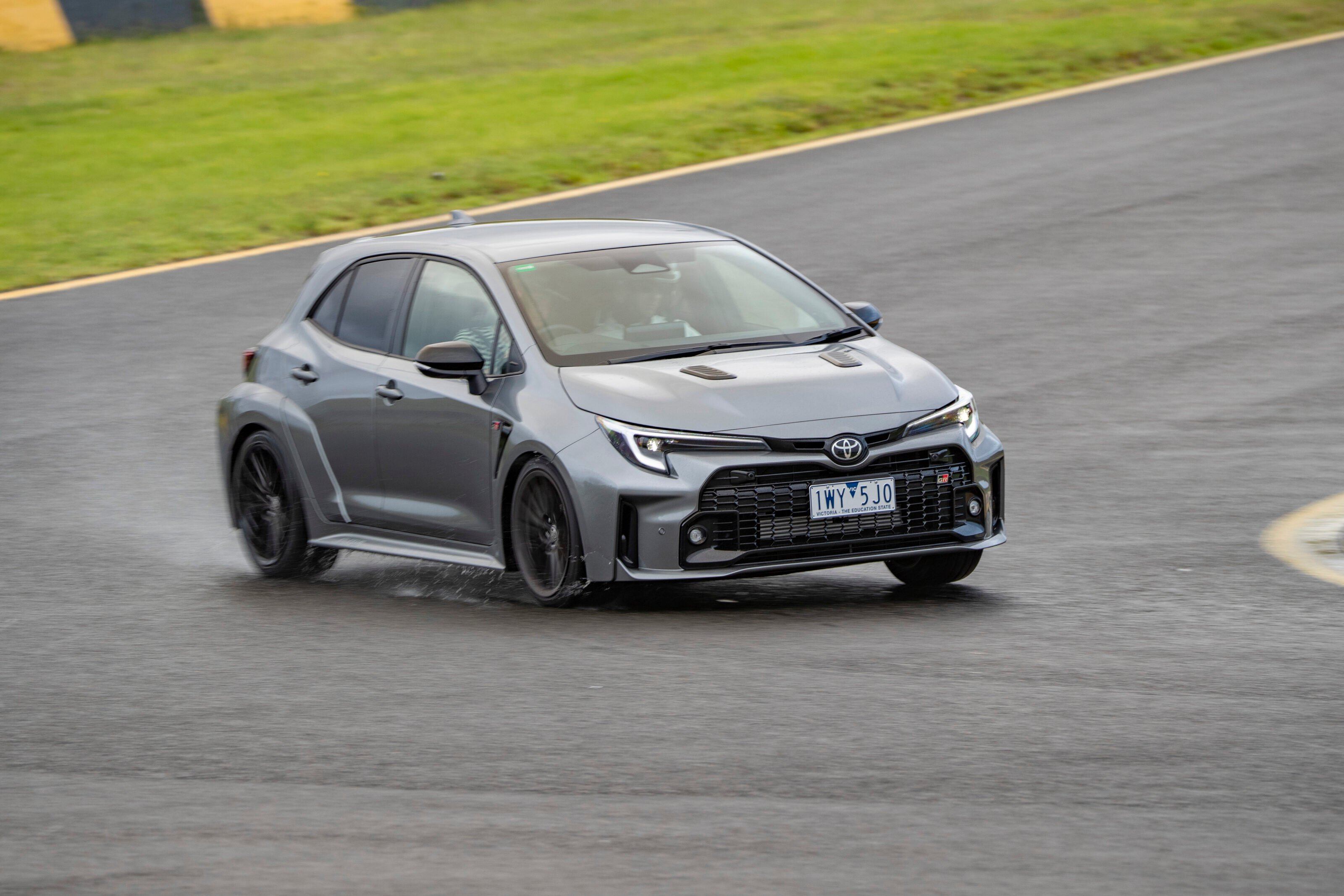
By the time we reached the technical South Circuit at Sydney Motorsport Park, the clouds had opened up, rendering the surface damp and typically unpredictable. The kind of conditions that can shatter a driver’s confidence in a poorly set-up car.
On the Bates’ recommendation, the GR Corollas had ESC set to more relaxed ‘Expert’ mode (how flattering) and the diff set to Track – a 50:50 torque split.
And what a pleasure the GR Corolla is to drive in inclement conditions. Changing grip levels are no match for its accurate steering, communicative chassis and pointy front end.
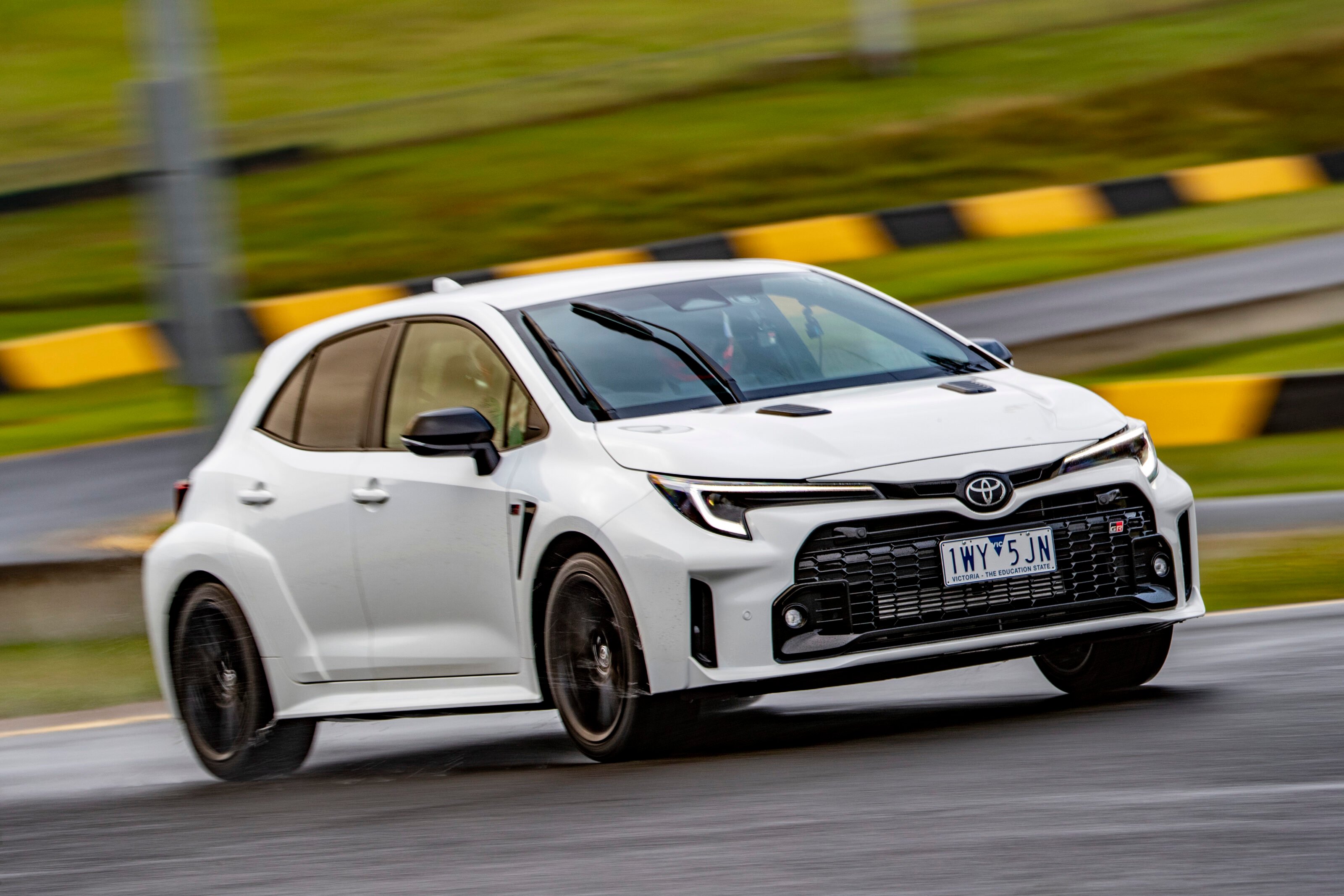
A particular highlight is the deft ESC; if you get greedy on the throttle, the nannies smoothly limit any slip. What it does allow (seemingly without limit) is over-rotation on turn-in – exactly what you want in this kind of vehicle. Once the nose is pointed towards the apex, simply nail the gas and let the LSDs effortlessly tug you out. It’s a magic feeling.
That’s part of the GR Corolla’s ‘analogue’ charm. The Torsen diffs aren’t clever enough to over-drive the outside rear wheel for faux-drifting like an Audi RS3’s electronic items, it’s on you. And that’s fun.
A firm and dependable brake pedal hooked up to four-piston front calipers, a sweet six-speed manual transmission with a friendly clutch, and rev-matching (should you like) finish off the GR Corolla package a treat.
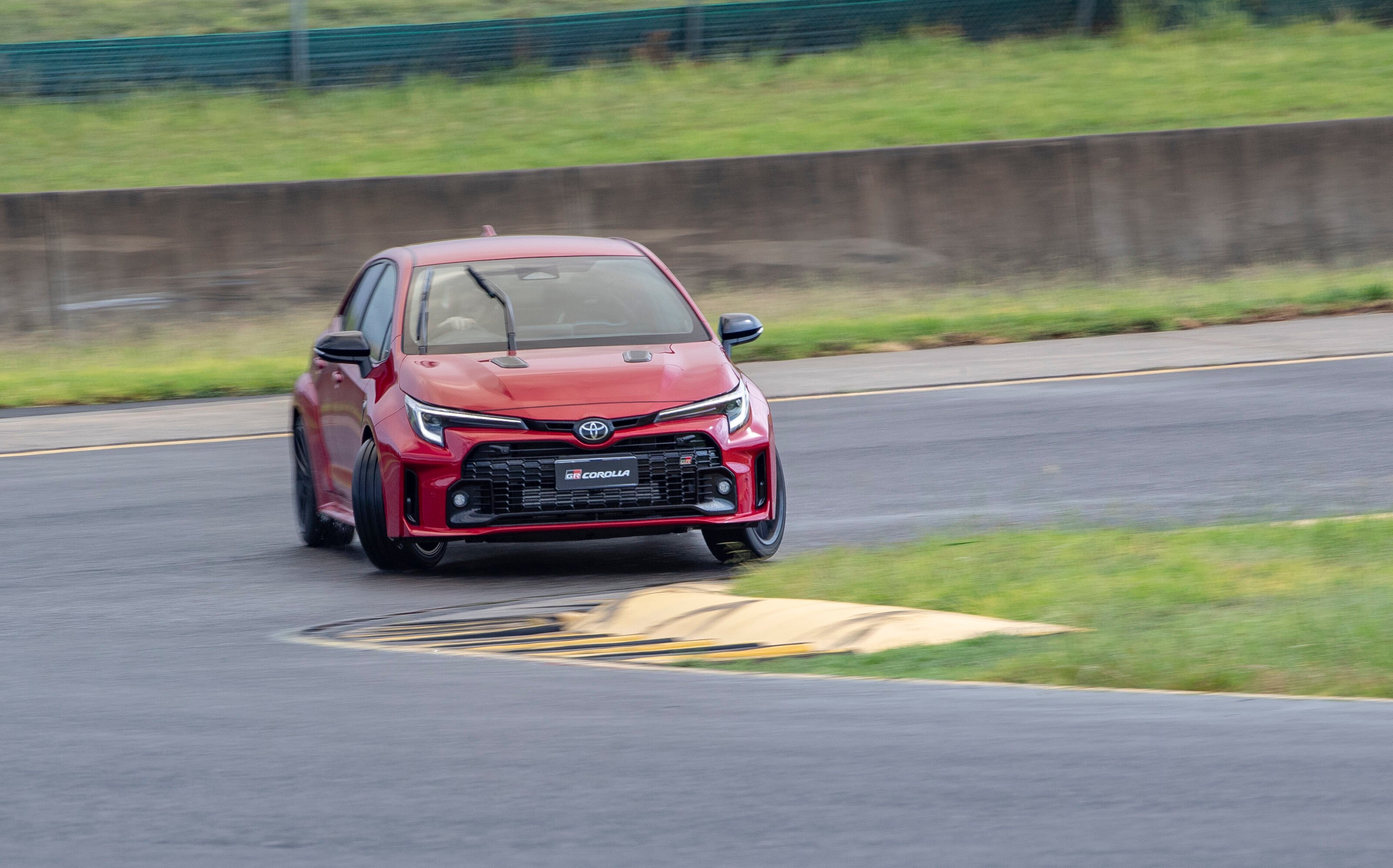
How much fuel does it use?
The GR Corolla slurps premium 98 RON unleaded at a rate of 8.4L/100km on the combined ADR cycle. We were unable to run fuel figures on the launch program, so we’ll have to wait for comparison time.
How safe is it?
Due to the significant chassis and structural differences, the GR Corolla does not carry the cooking model’s 2018 five-star ANCAP rating.
To offset that, the GR gets a host of driver assistance features, including:
| 2023 Toyota GR Corolla active safety features | |
|---|---|
| 7 airbags | Lane trace assist |
| Adaptive cruise control | Rear cross-traffic alert |
| Blind-spot monitoring | Rear parking sensors |
| Front parking sensors | Reverse camera |
| Lane departure warning | Traffic sign recognition |
| Forward auto emergency braking with pedestrian, cyclist and junction detection | |
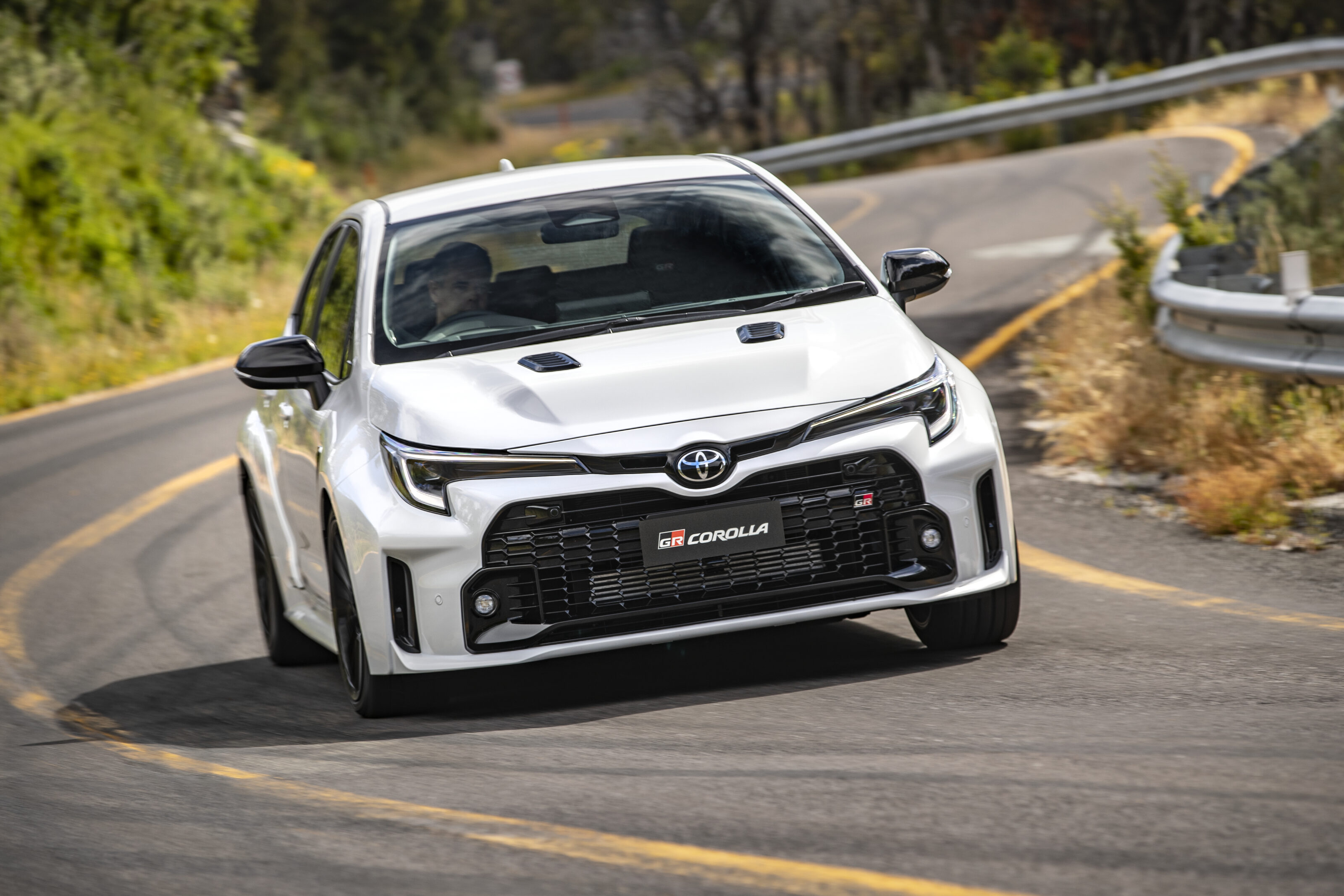
Warranty and running costs
The Toyota GR Corolla is covered by a five-year, unlimited-kilometre warranty.
Unlike Hyundai, Toyota does not market its warranty as track-inclusive. When pressed, executives said that the use case of the GR Corolla is understood intimately, and any warranty claims will be assessed on a case-by-case basis.
Part of this is more regular service intervals than your average Corolla. Toyota (wisely) advises maintenance every six months or 10,000km. The first six services are capped at $300 per visit, for $1800 over three years or 60,00km.
As if a sign of proof, GR Corolla chief engineer Naoyuki Sakamoto was taking media for hot laps and coming back repeatedly with smoking hot brakes. The car has been engineered to perform under hard, but not abusive, use.
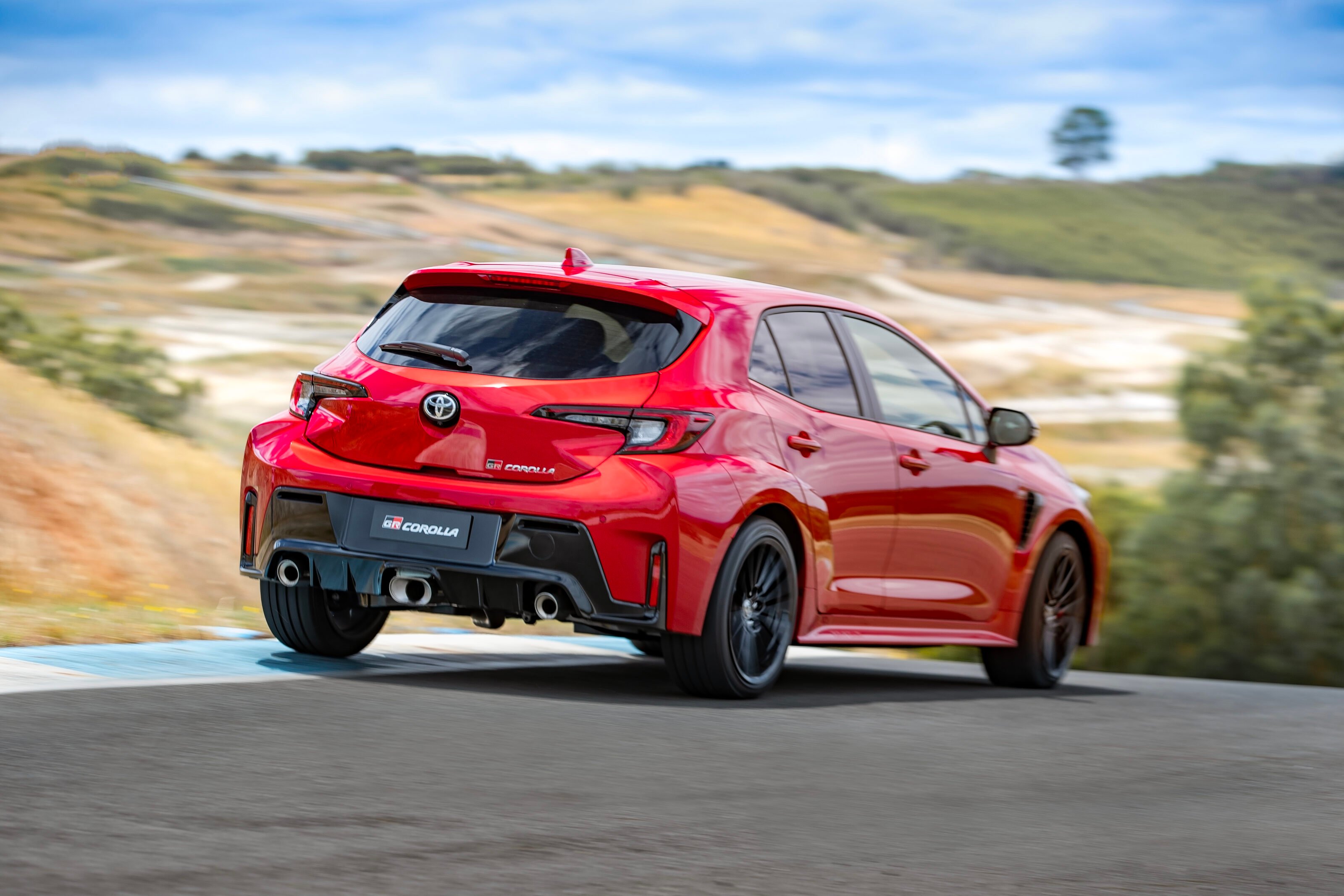
VERDICT
There was a danger that Toyota would swap out the Toyota Corolla’s efficient hybrid with the GR Yaris drivetrain and call it a day, paying little attention to distinguishing it from the smaller rally-bred car.
It has, thankfully, gone further. The GR Corolla is a more grown-up vehicle than the Yaris. There are usable seats for friends or children, a boot big enough for the weekly shop, uncompromised vision out and crucially, it has a different character.
The Corolla may only be a homologation pretender, but it’s not wanting for rally-bred charm. That unaugmented soundtrack and raw driving experience makes us think this might be one of the last mass-production cars we’ll ever call ‘analogue’.
If you’re thinking about putting your name down to order one, you had better do so quickly. With only 700 to sell in the first 12 months, and a driving experience this good, the GR Corolla is going to have lines around the block.
Does that make the GR Corolla the best hot hatch of 2023? Well, we think the Civic Type R might have something to say about that…
| Toyota GR Corolla | GTS | Morizo |
|---|---|---|
| Price | $62,300 + on-road costs | $77,800 + on-road costs |
| Drivetrain | ||
| Engine | 3cyl, 1.6-litre, dohc, direct-injected, turbo-petrol | |
| Layout | front engine, transverse, AWD | |
| Power | 221kW | |
| Torque | 370Nm | 400Nm |
| Gearbox | 6-speed manual, iMT rev matching | |
| Chassis | ||
| Body | steel, 5-door, 5-seat small hatchback | steel, 5-door, 2-seat small hatchback |
| L/W/H/Wu2013B | 4407/1851/1479/2640mm | |
| Track (F/R) | 1589/1624mm (Morizo 1626mm) | |
| Weight | 1485kg | 1440kg |
| Boot | 213L | 229L |
| Fuel/tank | 98 RON / 50 litres | |
| Economy (combined ADR81/02) | 8.4L/100km | 8.6L/100km |
| Suspension | Front: struts, coil springs, stabiliser bar. Rear: Trailing double wishbone, stabiliser bar | |
| Steering | electric rack-and-pinion, 2.4 turns lock-lock | |
| Front brakes | 356mm ventilated discs with 4-pot caliper | |
| Rear brakes | 297mm ventilated discs with 2-pot caliper | |
| Tyres | Yokohama Advan Apex V601 | Michelin Pilot Sport Cup 2 |
| Tyre size | 235/40R18 | 245/40R18 |
| Safety | ||
| ANCAP rating | NA | |
| 0-100km/h | 5.3 seconds (claimed) | 5.2 seconds (claimed) |
Score breakdown
Things we like
- Exciting power delivery
- It has five seats…
- Chassis is playful and adjustable
- Real engine sound
Not so much
- You can feel the 200kg over a GR Yaris
- The boot is still tiny
- Drive modes seem redundant
- Good luck getting one!
We recommend
-
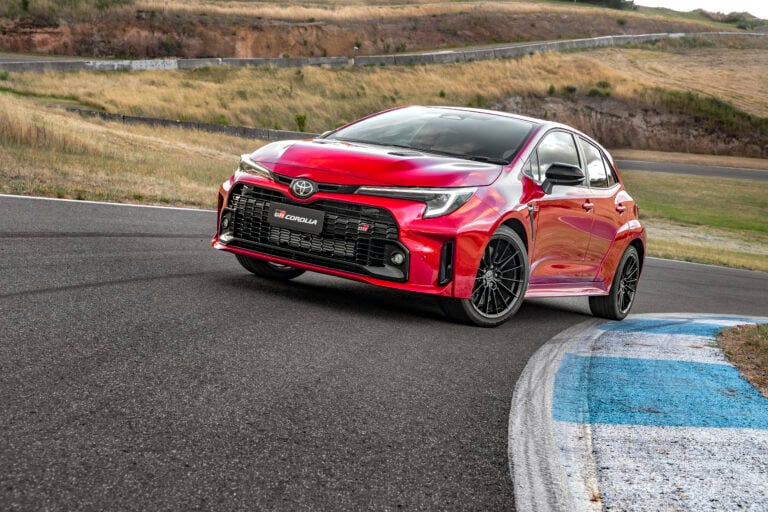 News
News2023 Toyota GR Corolla pricing and features
The GR Corolla has officially landed in Australia, with 700 units allocated for 2023
-
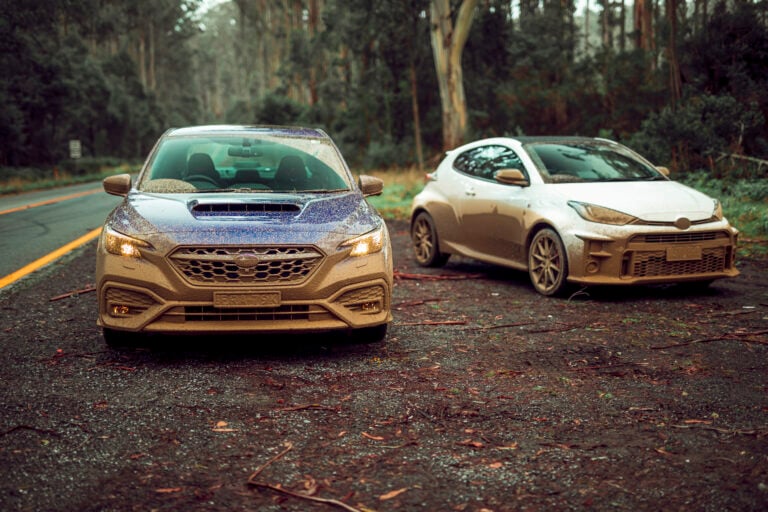 Comparisons
Comparisons2022 Subaru WRX vs Toyota GR Yaris Rallye comparison: Road and gravel!
Subaru’s reborn WRX is quicker, smarter and more luxurious but can it take down Toyota’s WRC inspired GR Rallye? Don your rally clobber, this one’s going to get dirty…
-
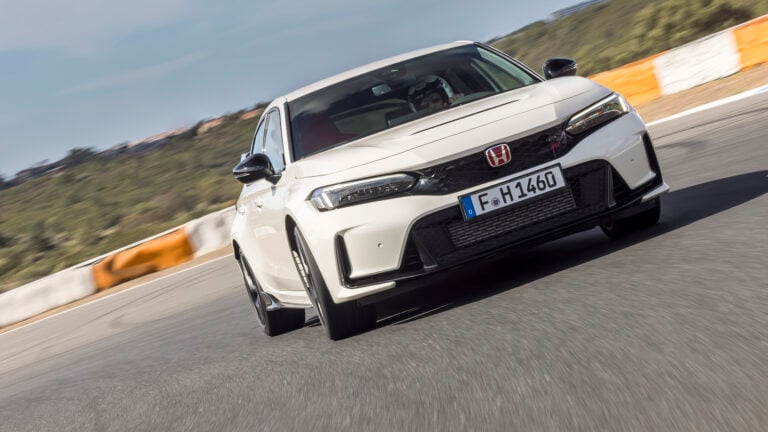 Reviews
Reviews2023 Honda Civic Type R review: New hero driven on road and track
Honda's new Civic Type R is better than its predecessor in just about every way, but is it worth the big asking price? Angus MacKenzie puts it to the test



